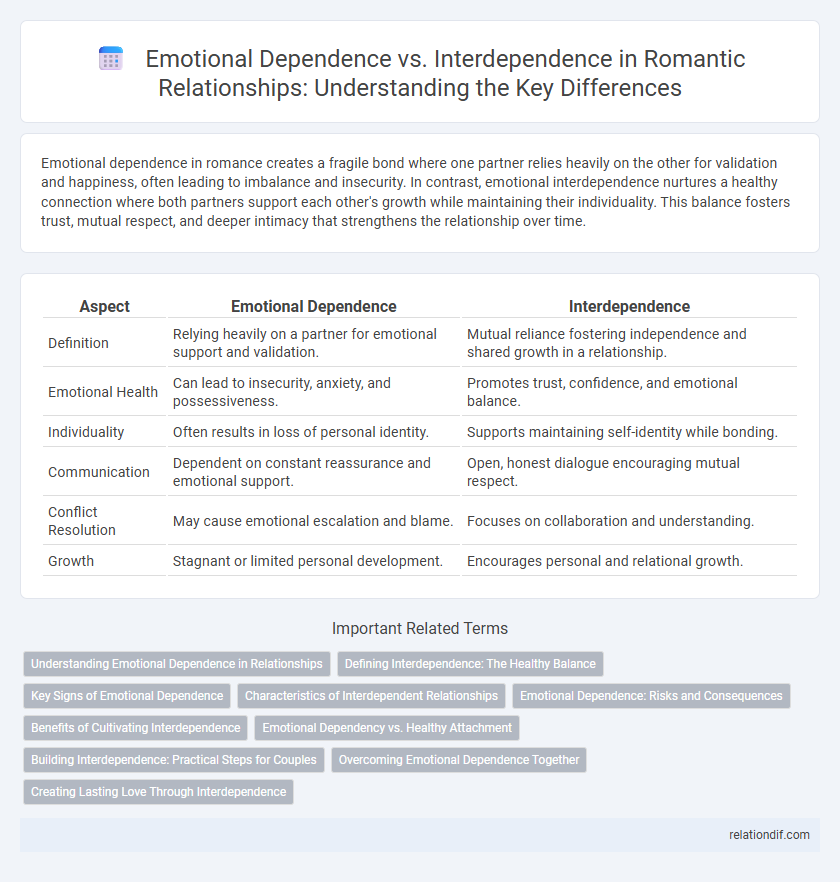Emotional dependence in romance creates a fragile bond where one partner relies heavily on the other for validation and happiness, often leading to imbalance and insecurity. In contrast, emotional interdependence nurtures a healthy connection where both partners support each other's growth while maintaining their individuality. This balance fosters trust, mutual respect, and deeper intimacy that strengthens the relationship over time.
Table of Comparison
| Aspect | Emotional Dependence | Interdependence |
|---|---|---|
| Definition | Relying heavily on a partner for emotional support and validation. | Mutual reliance fostering independence and shared growth in a relationship. |
| Emotional Health | Can lead to insecurity, anxiety, and possessiveness. | Promotes trust, confidence, and emotional balance. |
| Individuality | Often results in loss of personal identity. | Supports maintaining self-identity while bonding. |
| Communication | Dependent on constant reassurance and emotional support. | Open, honest dialogue encouraging mutual respect. |
| Conflict Resolution | May cause emotional escalation and blame. | Focuses on collaboration and understanding. |
| Growth | Stagnant or limited personal development. | Encourages personal and relational growth. |
Understanding Emotional Dependence in Relationships
Emotional dependence in relationships occurs when one partner relies excessively on the other for validation, support, and self-worth, creating an imbalance that can hinder personal growth. This reliance often leads to clinginess, insecurity, and fear of abandonment, which can strain the bond and reduce mutual respect. Understanding emotional dependence involves recognizing these patterns early and fostering interdependence, where both partners maintain individuality while supporting each other's emotional needs.
Defining Interdependence: The Healthy Balance
Interdependence in romance signifies a balance where partners maintain individual identities while mutually supporting each other's emotional needs, fostering growth and resilience in the relationship. Emotional dependence, by contrast, involves excessive reliance on one partner for validation and support, potentially leading to imbalance and dissatisfaction. Cultivating interdependence promotes trust, open communication, and shared responsibility, establishing a foundation for lasting intimacy and connection.
Key Signs of Emotional Dependence
Key signs of emotional dependence in romantic relationships include excessive need for reassurance, fear of abandonment, and difficulty making decisions without a partner's input. Individuals may experience heightened anxiety when separated from their significant other and rely heavily on their partner for validation and self-worth. Recognizing these behaviors is crucial for fostering healthier emotional interdependence, where both partners maintain individuality while supporting each other.
Characteristics of Interdependent Relationships
Interdependent relationships are characterized by mutual respect, trust, and effective communication, fostering emotional growth for both partners. Each individual maintains a strong sense of self while supporting their partner's needs and aspirations, creating a balanced dynamic. This emotional autonomy combined with connectedness enhances relationship satisfaction and resilience against conflicts.
Emotional Dependence: Risks and Consequences
Emotional dependence in romantic relationships often leads to a loss of personal identity and increased vulnerability to manipulation or emotional abuse. This reliance on a partner for self-worth and happiness can result in heightened anxiety, jealousy, and controlling behaviors. Over time, such dependence undermines mutual respect and equal partnership, ultimately weakening the relationship's stability and satisfaction.
Benefits of Cultivating Interdependence
Cultivating interdependence in romantic relationships fosters mutual support, enhancing emotional resilience and trust between partners. This balanced dynamic encourages personal growth while strengthening the bond, allowing both individuals to maintain their identities without becoming emotionally dependent. Embracing interdependence leads to healthier communication, greater intimacy, and a more fulfilling partnership.
Emotional Dependency vs. Healthy Attachment
Emotional dependency in romance often manifests as excessive reliance on a partner for self-worth and security, leading to imbalance and vulnerability in the relationship. Healthy attachment, rooted in secure bonding, allows partners to maintain individuality while providing mutual support and trust, fostering both emotional connection and autonomy. Research in attachment theory highlights that interdependence, rather than dependence, creates resilient partnerships grounded in emotional stability and mutual respect.
Building Interdependence: Practical Steps for Couples
Building interdependence in romance requires cultivating mutual trust, open communication, and shared responsibilities that empower both partners to thrive individually and together. Couples can foster emotional resilience by setting healthy boundaries while supporting each other's growth, thereby creating a balanced dynamic that moves beyond emotional dependence. Practically, scheduling regular check-ins and expressing appreciation contribute to nurturing a sustainable, connected partnership.
Overcoming Emotional Dependence Together
Overcoming emotional dependence in a romantic relationship involves cultivating interdependence, where both partners maintain individual identities while supporting each other's growth. Building trust, open communication, and mutual respect fosters a balanced dynamic that prevents codependency and strengthens the emotional bond. Couples therapy and shared goal-setting techniques enhance resilience, enabling partners to navigate challenges collaboratively and sustainably.
Creating Lasting Love Through Interdependence
Creating lasting love through interdependence involves balancing emotional support with personal autonomy, fostering deeper connection without losing individual identity. Couples who cultivate interdependence experience mutual growth, effective communication, and resilience in the face of challenges, as each partner contributes uniquely to the relationship. Emotional dependence can lead to imbalance and insecurity, whereas interdependence promotes trust, respect, and a sustainable, loving bond.
emotional dependence vs interdependence Infographic

 relationdif.com
relationdif.com